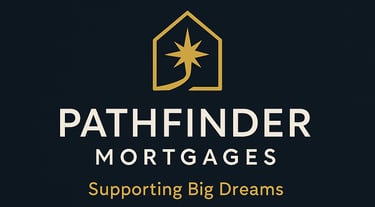📞 204-296-1169 📥 Daniel@pathfindermortgages.com
Understanding Credit System in Canada
Daniel Adeyinka
8/9/20254 min read
Understanding Credit in Canada — Let’s Start With a Story
Imagine your friend Toms comes to you and asks to borrow $5,000 for three months. It’s the first time he’s ever asked you for a loan. What’s your next move?
Chances are, you’ll stop and think:
Can I trust Toms to pay me back?
Has he been reliable in the past?
Does he handle money responsibly?
You're not just deciding based on the request — you're making a decision based on your relationship and past experiences with him.
Now Think About This:
That’s exactly what banks and financial institutions do when you apply for credit. They don’t want to lose money either, so they look for proof that you’ve handled money well in the past. That proof?
👉 Your credit history.
What Is Credit History?
Your credit history is a record of how you’ve managed various types of credit over time — things like:
Credit cards
Student loans
Car loans
Mortgages or rent
Phone and utility bills
Lines of credit
If it’s a financial agreement where you’ve promised to pay over time, it likely shows up in your credit history.
Think of it like your financial reputation. It tells lenders how likely you are to repay what you borrow.
Credit = Behavior + Responsibility
Your credit history doesn’t just say how much you’ve borrowed — it shows:
If you paid on time
How often you missed payments
How much of your available credit you’re using
If you’ve applied for a lot of credit recently
How long you’ve had your credit accounts open
It’s all about your borrowing and repayment behaviour — past and present.
Who Tracks Your Credit History in Canada?
In Canada, your credit history is managed by two main companies known as credit bureaus:
Equifax
TransUnion
Most banks, lenders, utility companies, and credit card providers report your activity to these bureaus, who then generate your credit report and calculate your credit score.


Even Spider-Man is taking a moment to learn how the credit system works in Canada — because building good credit is a superpower for everyone!
(Image source : unsplash)
<!-- Google tag (gtag.js) --> <script async src="https://www.googletagmanager.com/gtag/js?id=G-BV0W5G1DZM"></script> <script> window.dataLayer = window.dataLayer || []; function gtag(){dataLayer.push(arguments);} gtag('js', new Date()); gtag('config', 'G-BV0W5G1DZM'); </script>


Credit score overview displayed on a laptop screen — your first step to understanding credit basics in Canada
(Image source: Unsplash)
Credit Score: What You Should Know
A Simple Breakdown of How It Works — and Why It Matters
What Is a Credit Score, and How Is It Calculated?
Your credit score is a number between 300 and 900, generated by a computer algorithm that analyzes your credit history. It helps lenders quickly group people by risk level when deciding whether to approve credit applications like loans, credit cards, or mortgages.
Each of the two major credit bureaus in Canada — TransUnion and Equifax — calculates your score using its own formula. This means that you have at least two credit scores: one from each bureau.
Depending on the size and policy of the financial institution:
Big banks usually check both bureaus
Smaller lenders might rely on only one
Pro Tip:
To stay in control of your credit health, open accounts with both Equifax and TransUnion. That way, you can check your reports, monitor changes, and spot any errors before applying for credit.
Credit Score Ranges in Canada
Based on the bureau’s algorithm, your score will fall between 300 (lowest) and 900 (highest).
Score Range Rating What It Means
300 – 599 Poor : High risk to lenders. Approval is unlikely without strong supporting factors
600 – 679 Average : Approval may come with conditions or extra documentation
680 – 749 Good : Considered reliable; easier approval with decent terms
750 – 799 Very Good : Low risk borrower; may qualify for better rates and faster approval
800 – 900 Excellent : Credit behavior; access to premium offers, rates, and top-tier terms
The goal is to aim for a score of 680 or higher — that's where mortgage lenders typically feel comfortable doing business.
Why Credit Score Matters?
Your credit score tells lenders:
How reliable you’ve been with money
Whether you repay debts on time
If you manage credit responsibly
What kind of risk you pose as a borrower
It affects whether you’re:
Approved or denied for loans and mortgages
Offered a high or low interest rate
Required to get a co-signer or extra documents
Two Free Ways to Check Your Credit Score
Knowing your score is the first step toward improving it — and you can do it without paying a dime.
1. Create an account with the credit bureaus.
Sign up directly with Equifax or TransUnion to access a free copy of your credit report. This gives you a full view of your credit history, open accounts, and any issues that may be pulling your score down.
2. Check through your bank account.
Most Canadian banks are members of the credit bureaus and give you free access to your score right from your online banking. While this view may be more limited than the full bureau report, it’s still a great starting point to monitor your score regularly.
👤 Final Thought
Your credit score is your financial reputation.
It’s not the only thing that matters — but it’s one of the first things lenders look at.
If your score is low or you’re not sure where you stand, don’t panic. As a certified credit counsellor Candidate, I can help you understand your report, improve your score, and prepare for future borrowing — including mortgage approval.
Give me a call on 204-296-1169


Contact
📞 204-296-1169
📥 daniel@pathfindermortgages.com
Winnipeg Office
193 Henlow Bay, Winnipeg, MB.
R3Y 1G4
Calgary Office
29A Elizabeth Street, Okotoks AB.
T1S 1B1




Daniel Adeyinka
Mortgage Agent | Mortgage Architect
AFCC® Financial Counseling CANDIDATE
@ 2025 All Rights Reserved.
